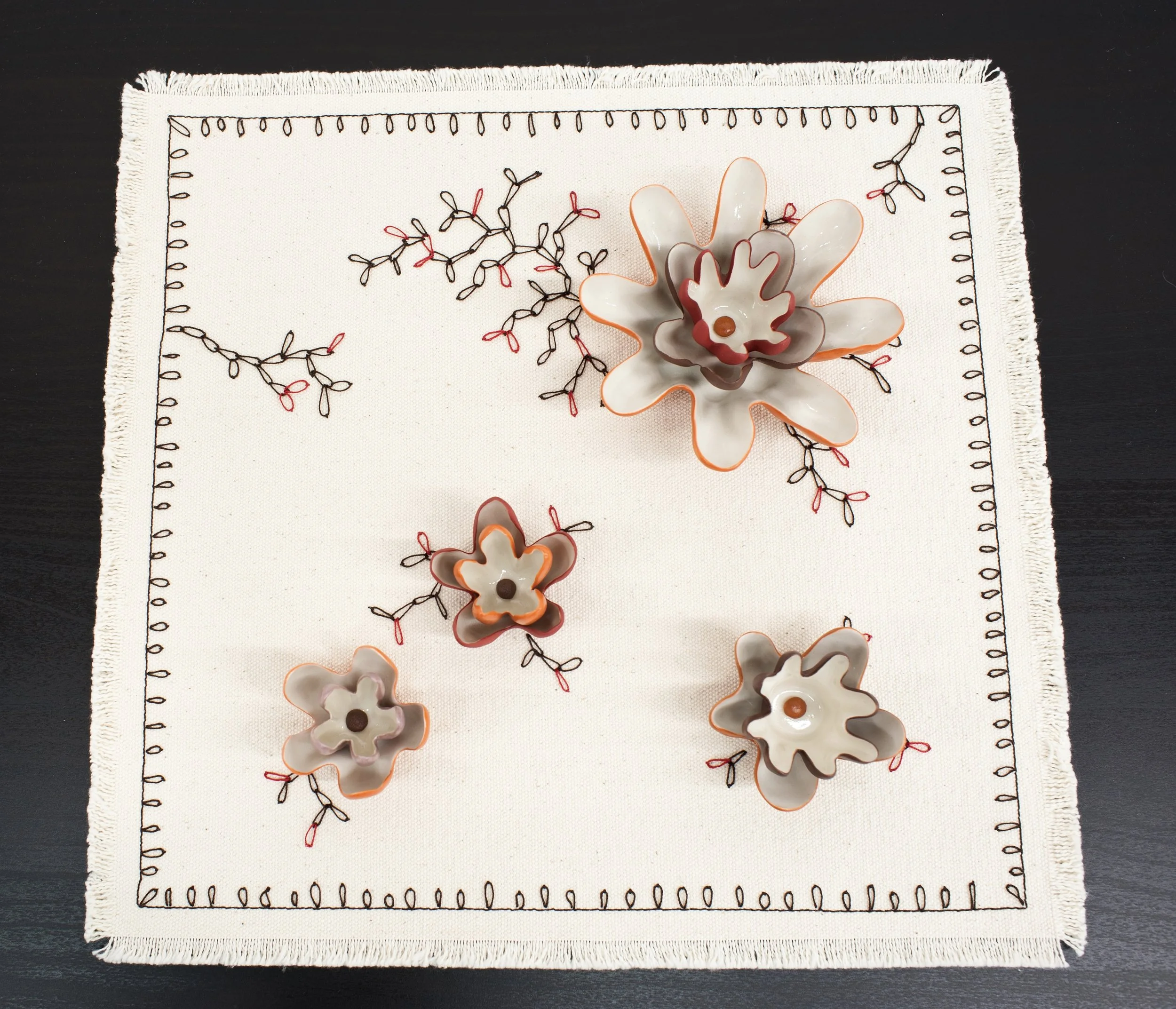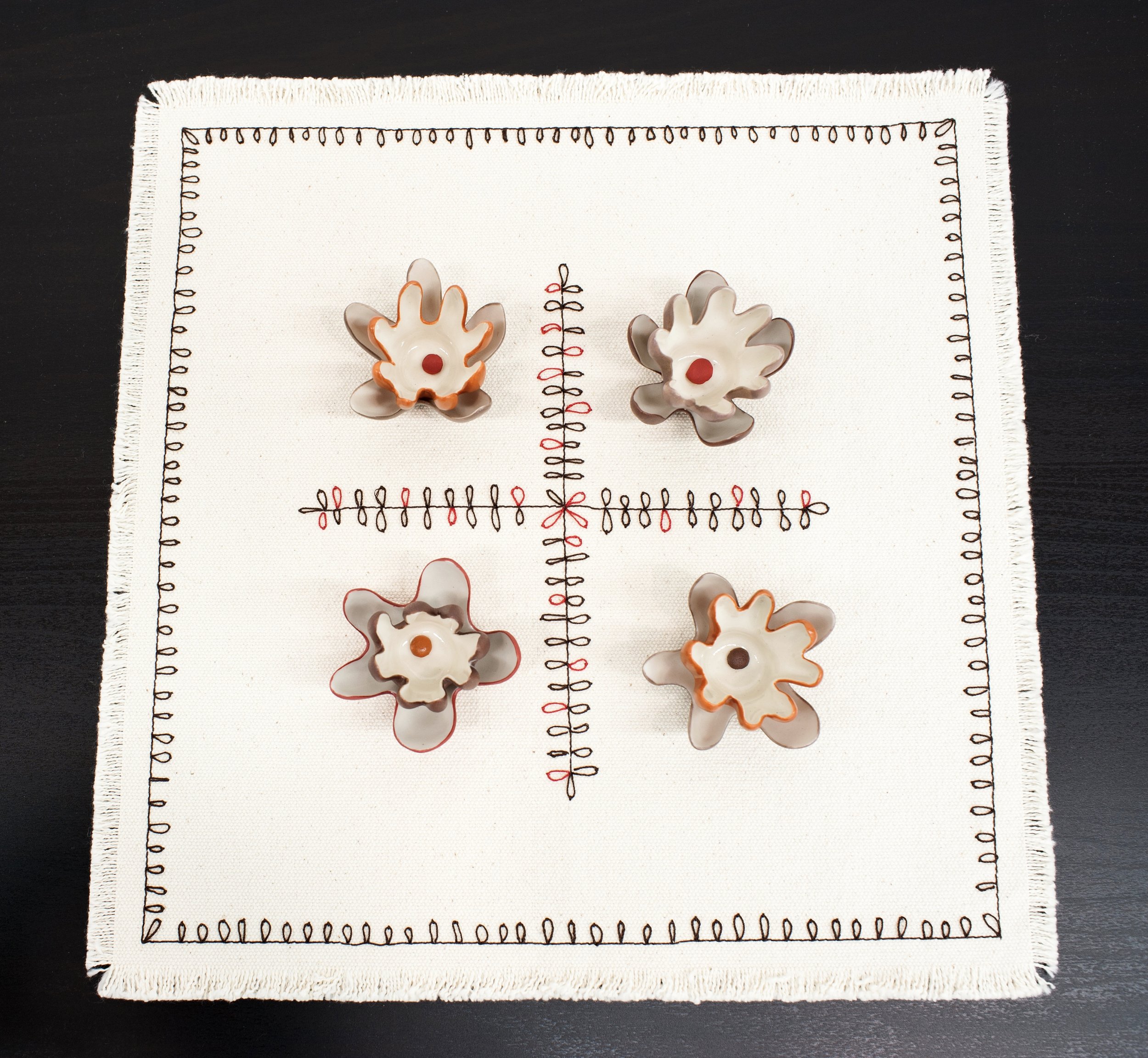Democracy
Metcalfe Gallery
Brisbane Institute Of Art, 41 Grafton St, Windsor, Brisbane.
Friday October 26 - Tuesday November 6, 2018
Photography by Rod Buchholz
Introduction
With the election of President Trump in the USA, Democracy and how well it functions have become contentious topics.
Does it work?
Does it matter what the individual thinks?
Does an individual have any power to shape their own life let alone the country in which they live?
Ideally, Democracy values each individual equally, while accepting their uniqueness. Each of the works in this show is unique and often presented in groupings. In each group, the loss of any one element is of consequence. I aim to explore the theme of Democracy using this visual language, exploring power structures, and how it feels to be one of many.
The subtext is: The Individual Does Matter.
Meaningful Graffiti (above and below)
Polymer paint and ink on Canvas. Completed by visitors and the artist with paint pens and ink.
The Electoral Roll
The Electoral Roll is a list of unique individuals whose vote is of equal / identical value.
Each of these tiles began as an identical white bathroom tile. Then a DNA of 4 or 5 glazes was used to individualise it.
On the wall it’s easy to see that each individual’s character or voice has an influence on the whole and contributes a unique beauty.
And if an individual is missing, it makes a difference.
And, then a second consideration: “how do you get on the Roll?” Hence the Illegal Aliens - the same DNA, but they’re so different! Where do they belong?
The Electoral Roll (above)
Glazed ceramic tiles on timber.
The Illegal Aliens 1 & 2 (above)
Glazed ceramic tiles on timber.
Society
In order to provide services, Society uses structures, like hospitals, government departments, and banks. Some institutions are rigid and hierarchical. Others are inherently more flexible and provide their members with a feeling of personal connection.
These multilayered porcelain pieces play with these ideas about institutions, and their relationships with the individual.
Society: The Co-operatives (above)
Slipcast porcelain on embroidered canvas.
Society: Hierarchy (above)
Slipcast porcelain on embroidered canvas.
Society: The Mixed Economy (above)
Slipcast porcelain on embroidered canvas.
Society: The Four Estates (above)
Slipcast porcelain on embroidered canvas.
Sometimes It’s Just Like Juggling (view of wall installation above and side view showing wall and floor components below)
Slipcast glazed earthenware.
Mountains
Mountains are often used as metaphors for problems or goals: How do you climb a mountain or move a mountain?
The answer to these questions involves breaking the task down into smaller parts.
Climbing a mountain happens one step at a time; Moving one, one stone at a time.
Tackling issues in society is done in much the same way: one piece of information, one change of opinion, one letter, one email, one protest, one vote, one piece of legislation at a time.
And it’s something we’re all familiar with. Achieving anything worthwhile takes many small thoughtful steps.
Mountains 1 (above)
Handbuilt glazed earthenware.
Mountains 2: How Do You Climb A Mountain? (above foreground)
Handbuilt glazed earthenware.
Mountains 3: How Do You Move A Mountain? (above)
Handbuilt earthenware.
Domestic Policy
“Democracy must be something more than two wolves and a sheep voting on what to have for dinner.” (James Bovard, from his book “Lost Rights”)
Democracies function by allowing the majority to rule while safeguarding the rights of minorities.
In 1948, these rights were described in a comprehensive way by the United Nations in their Universal Declaration of Human Rights.
A core value of the Declaration is that the rights described apply to every human being on the planet no matter who they are, i.e. the rights are Universal.
They also cover all aspects of human life. Here, their Universality, the freedom to Marry and raise a family, access to adequate Housing and to Justice are explored using crockery - hence Domestic Policy!
Domestic Policy: Universal (above)
Drape-moulded glazed stoneware.
Domestic Policy: Marriage and Family (above)
Drape-moulded glazed stoneware.
Domestic Policy: Housing (above)
Drape-moulded glazed stoneware.
Domestic Policy: Justice (above)
Drape-moulded glazed stoneware.
Threads In A Fabric 1 & 2 (above)
Glazed ceramic tiles on timber, framed.
The Path of Worth
When “Somebody ought to do something about that!” what is the path of Worth or Purpose?
This excerpt from Terry Pratchett’s novel, “Unseen Academicals”, looks at this dilemma:
“What does ‘worth’ mean, Mister Nutt?”
“It means that you leave the world better than when you found it,” said Nutt. “I don’t think there are absolutes … I think … that you do the best you can with what you have.”…
“I don’t think it’s about what you end up with,” said the dwarf. “It’s about what you end up with compared with what you started with.” …
“Of course, all he’s saying is you’ve got to do your best,” said the driver. “And the more best you’re capable of, the more you should do.”
(Pratchett, T. (2009). Unseen Academicals. (p 405 - 407) London, UK: Corgi)
The Path of Worth 1 & 2 (above)
Glazed ceramic tiles on timber.
The Path of Worth 3 (above)
Glazed ceramic tiles on timber.
Responsibility
The rub with democracy is that we all share the responsibility, the burden, for outcomes.
Often burdens are thought of as weights across our shoulders and instinctively we understand how that feels and how our shoulders move to make carrying something more comfortable
Responsibility 1,2 & 3 (above)
Handbulit glazed earthenware.
Responsibility 1 (above)
Handbulit glazed earthenware.
Responsibility 2 (above)
Handbulit glazed earthenware.
Responsibility 3 (above)
Handbulit glazed earthenware.
I Am A Drop In The Ocean, I Am The Ocean (above)
Handbuilt glazed earthenware.
Recognition (above)
Glazed ceramic tiles on timber.
Same, Same, But Different (above)
Glazed ceramic tiles on timber.
Progress (above)
Glazed ceramic tiles on timber.
Below are links to further information on the show:



































